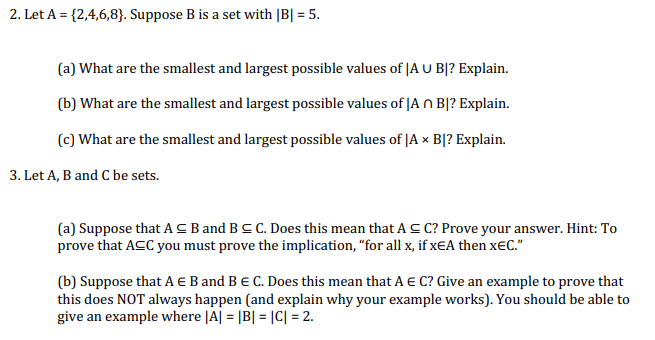2. Let A = {2,4,6,8}. Suppose B is a set with |B| = 5. (a) What are the smallest and largest possible values of |A U B|? Explain. (b) What are the smallest and largest possible values of JA n B|? Explain. (c) What are the smallest and largest possible values of |A × B|? Explain. 3. Let A, B and C be sets. (a) Suppose that AS B and BS C. Does this mean that A S C? Prove your answer. Hint: To prove that ACC you must prove the implication, "for all x, if x€A then x€C." (b) Suppose that A € B and B e C. Does this mean that A € C? Give an example to prove that this does NOT always happen (and explain why your example works). You should be able to give an example where |A| = |B| = |C| = 2.
2. Let A = {2,4,6,8}. Suppose B is a set with |B| = 5. (a) What are the smallest and largest possible values of |A U B|? Explain. (b) What are the smallest and largest possible values of JA n B|? Explain. (c) What are the smallest and largest possible values of |A × B|? Explain. 3. Let A, B and C be sets. (a) Suppose that AS B and BS C. Does this mean that A S C? Prove your answer. Hint: To prove that ACC you must prove the implication, "for all x, if x€A then x€C." (b) Suppose that A € B and B e C. Does this mean that A € C? Give an example to prove that this does NOT always happen (and explain why your example works). You should be able to give an example where |A| = |B| = |C| = 2.
Chapter9: Sequences, Probability And Counting Theory
Section9.5: Counting Principles
Problem 40SE: A family consisting of 2 parents and 3 children is to pose for a picture with 2 family members in...
Related questions
Question

Transcribed Image Text:2. Let A = {2,4,6,8}. Suppose B is a set with |B| = 5.
(a) What are the smallest and largest possible values of JA U B|? Explain.
(b) What are the smallest and largest possible values of |A O B|? Explain.
(c) What are the smallest and largest possible values of |A × B|? Explain.
3. Let A, B and C be sets.
(a) Suppose that ACB and BC C. Does this mean that A C C? Prove your answer. Hint: To
prove that ACC you must prove the implication, “for all x, if xEA then x€C."
(b) Suppose that A E B and B e C. Does this mean that A € C? Give an example to prove that
this does NOT always happen (and explain why your example works). You should be able to
give an example where |A| = |B| = |C| = 2.
Expert Solution
This question has been solved!
Explore an expertly crafted, step-by-step solution for a thorough understanding of key concepts.
This is a popular solution!
Trending now
This is a popular solution!
Step by step
Solved in 4 steps

Follow-up Questions
Read through expert solutions to related follow-up questions below.
Recommended textbooks for you


College Algebra
Algebra
ISBN:
9781305115545
Author:
James Stewart, Lothar Redlin, Saleem Watson
Publisher:
Cengage Learning

Algebra and Trigonometry (MindTap Course List)
Algebra
ISBN:
9781305071742
Author:
James Stewart, Lothar Redlin, Saleem Watson
Publisher:
Cengage Learning


College Algebra
Algebra
ISBN:
9781305115545
Author:
James Stewart, Lothar Redlin, Saleem Watson
Publisher:
Cengage Learning

Algebra and Trigonometry (MindTap Course List)
Algebra
ISBN:
9781305071742
Author:
James Stewart, Lothar Redlin, Saleem Watson
Publisher:
Cengage Learning


College Algebra (MindTap Course List)
Algebra
ISBN:
9781305652231
Author:
R. David Gustafson, Jeff Hughes
Publisher:
Cengage Learning

Holt Mcdougal Larson Pre-algebra: Student Edition…
Algebra
ISBN:
9780547587776
Author:
HOLT MCDOUGAL
Publisher:
HOLT MCDOUGAL